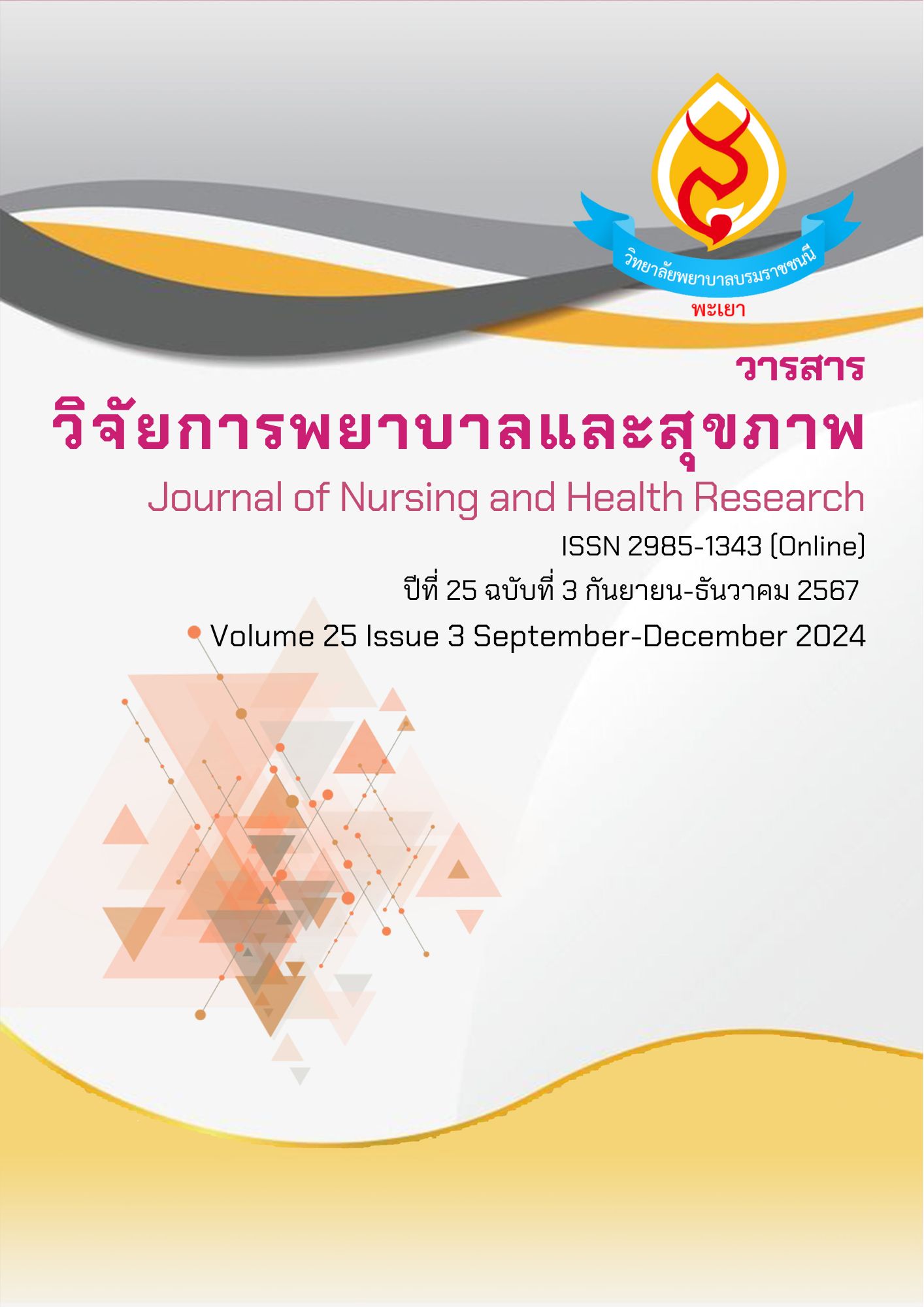การพัฒนารูปแบบการบริหารจัดการบูรณาการนโยบาย Health For Wealth สู่เส้นทางท่องเที่ยวเชิงสุขภาพพื้นที่จังหวัดเพชรบุรี
คำสำคัญ:
รูปแบบการบริหารจัดการ, เส้นทางท่องเที่ยวเชิงสุขภาพ, ศูนย์เวลเนส, เศรษฐกิจสุขภาพบทคัดย่อ
นโยบายเศรษฐกิจสุขภาพมีความสำคัญที่เชื่อมโยงต่อการสนับสนุนการดูแลสุขภาพเชิงป้องกันและฟื้นฟูสุขภาพรวมถึงเศรษฐกิจชุมชนซึ่งจะส่งผลต่อการพัฒนาคุณภาพชีวิตและความเป็นอยู่ที่ดีของประชาชน การวิจัยและพัฒนานี้มีวัตถุประสงค์เพื่อพัฒนารูปแบบการบริหารจัดการบูรณาการนโยบาย Health For Wealth สู่เส้นทางท่องเที่ยวเชิงสุขภาพพื้นที่จังหวัดเพชรบุรี ดำเนินการเป็น 3 ระยะ ได้แก่ ระยะที่ 1 การพัฒนารูปแบบ เบื้องต้น ระยะที่ 2 การทดลองและปรับปรุงรูปแบบ และระยะที่ 3 การนำไปใช้และประเมินผล เครื่องมือที่ใช้ ประกอบด้วย แบบสอบถามและแบบสัมภาษณ์แบบกึ่งโครงสร้าง วิเคราะห์ข้อมูลด้วยสถิติทดสอบทีคู่ และการวิเคราะห์เชิงเนื้อหา ผลการศึกษา พบว่า รูปแบบการบริหารจัดการ คือ DIAMOND ซึ่งประกอบด้วย D: Diamond คือเมืองเพชรบุรี I: Integration คือ การบูรณาการนโยบายเศรษฐกิจสุขภาพ A: Anti-aging Long Living คือการส่งเสริมการดำเนินชีวิตด้วยศาสตร์การชะลอวัย M: Meaningful Wellness Phetchaburi คือ การบูรณาการนโยบายจังหวัดสุขภาพดีที่มีความหมายเพชรบุรี O: Operation คือ การดำเนินการอย่างต่อเนื่อง มีนโยบายชัดเจน N: Network คือ การสร้างเครือข่ายหุ้นส่วนธุรกิจสุขภาพ และ D: Database คือ จัดทำฐานข้อมูลศูนย์เวลเนสจังหวัดเพชรบุรี หลังพัฒนารูปแบบ เกิดศูนย์เวลเนสที่ได้รับการรับรองเพิ่มขึ้น ร้อยละ 56.67 สถานประกอบการมีจำนวนลูกค้าที่ใช้บริการต่อคนต่อปีและมีรายได้เฉลี่ยต่อปีที่เกี่ยวกับศูนย์เวลเนสเพิ่มขึ้นอย่างมีนัยสำคัญทางสถิติ (p<.05) ดังนั้นหน่วยงานที่เกี่ยวข้องทั้งภาครัฐ เอกชน และภาคประชาชน ควรให้ความสำคัญในการสร้างความร่วมมือที่เข้มแข็งและต่อเนื่องในการพัฒนาศูนย์เวลเนสให้มีคุณภาพบริการในระดับสากลเพื่อผลกระทบที่ดีต่อภาคเศรษฐกิจ สังคม และคุณภาพชีวิตของประชาชนในพื้นที่ต่อไป
เอกสารอ้างอิง
Daniel, D., Gupta, R., & Richards, D. G. (1991). Calculation of the pion's quark distribution amplitude in lattice QCD with dynamical fermions. Physical Review D, 43(11), 3715.
Department of health service support, ministry of public health. (2018). Strategies for Developing Thailand as an International Health Hub (Medical hub) (2017-2026). Samut Sakhon: born to be publishing. (in Thai)
Department of Thai Traditional and Alternative Medicine, Ministry of Public Health. (2021). Criteria for evaluating wellness centers. Samja Roengpanich (Bangkok) (in Thai)
Dokchan, T., & Chuamuangphan, N. (2021). Potential for managing tourist attractions towards developing health tourism models in the western region. Journal of Research and Development, Loei Rajabhat University, 16(55), 58-69. (in Thai)
Fayol, H. (1949). General and industrial management (2nd ed.). Sir Isaac Pitman & Sons, Ltd.
Global Wellness Institute. (2023a). The Global Wellness Tourism Index. https://globalwellnessinstitute.org
Global Wellness Institute. (2023b). Wellness tourism will cross the $1 trillion mark in 2024. Retrieved from https://globalwellnessinstitute.org
Keeves, P. J. (1988). Educational research, methodology, and measurement: An international handbook. Pergamon Press.
Luangaram, B. & Maiprasert, M. (2016, Junly 7). New trend in health management and RCTs [Paper presentation]. 1st SMART: The First Synergistic Meeting of Anti-Aging and Regenerative Medicine of Thailand: “What is Wellness? Fact & Future”, Dhurakij Pundit University, 266-280. (in Thai)
Mtapuri, O., & Giampiccoli, A. (2017). The role of community participation in sustainable tourism development: A case of the tourism development and growth strategy in South Africa. Tourism and Hospitality Research, 17(3), 307-319. https://doi.org/10.1177/1467358416649192
Naewjampa, S., Sinthawanont, J., Iamnakha, N., & Hongprasert, S. (2021). Development of wellness innovations for service provision in health establishments [Science Promotion Fund]. epartment of Health Service Support, Ministry of Public Health. (in Thai)
Phetchaburi Office of Tourism and Sports. (2023). Tourism report for Phetchaburi Province. Phetchaburi Province. (in Thai)
Phetchaburi Provincial Public Health Office. (2023). Report on health establishments in Phetchaburi Province. Phetchaburi Province. (in Thai)
Riwattana S., Phonngam P., & Sriwatanakul K. (2023). Development of activities model to promote wellness tourism in Chonburi province. Journal of Social Science and Cultural, 7(10), 182-191. (in Thai)
Shounchupon A. (2022). Guidelines for developing the wellness tourism to encourage the competitive advantage with high value services in Sa Kaeo province. Valaya Alongkorn Review (Humanities and Social Science), 12(2), 99-117. (in Thai)
Smith, A., & Jones, B. (2019). The impact of integrated health policies on wellness tourism. International Journal of Health Policy and Management, 8(3), 123-134.
UNESCO. (2021). Phetchaburi, Thailand: City of Gastronomy. UNESCO Creative Cities of Gastronomy. Retrieved from https://en.unesco.org/creative-cities
Wang, Y., Zhang, D., & Liu, J. (2020). Evaluating the impact of wellness tourism on local communities. Tourism Management, 78, 104-114.
World Health Organization. (2023). Global health sector strategies 2022-2030. World Health Organization. https://www.who.int/teams/global-hiv-hepatitis-and-stis-programmes/strategies/global-health-sector-strategies
Yongyot, T. (2023). Progress of the subcommittee on advancing the Health for Wealth policy. Office of the Permanent Secretary, Ministry of Public Health. (in Thai)
ดาวน์โหลด
เผยแพร่แล้ว
รูปแบบการอ้างอิง
ฉบับ
ประเภทบทความ
สัญญาอนุญาต
ลิขสิทธิ์ (c) 2024 วารสารวิจัยการพยาบาลและสุขภาพ

อนุญาตภายใต้เงื่อนไข Creative Commons Attribution-NonCommercial-NoDerivatives 4.0 International License.



